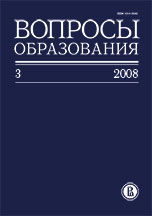Наиболее читаемые статьи этого автора (авторов)
- Ефим Галицкий, Марк Левин, Затраты домохозяйств на образование детей и взрослых (по результатам третьей волны мониторинга «Экономика образования») , Вопросы образования / Educational Studies Moscow: № 2 (2005)
- Азер Эфендиев, Евгения Балабанова, Ефим Галицкий, Результаты и проблемы подготовки современного специалиста сквозь призму карьерного роста выпускников-менеджеров , Вопросы образования / Educational Studies Moscow: № 4 (2009)








